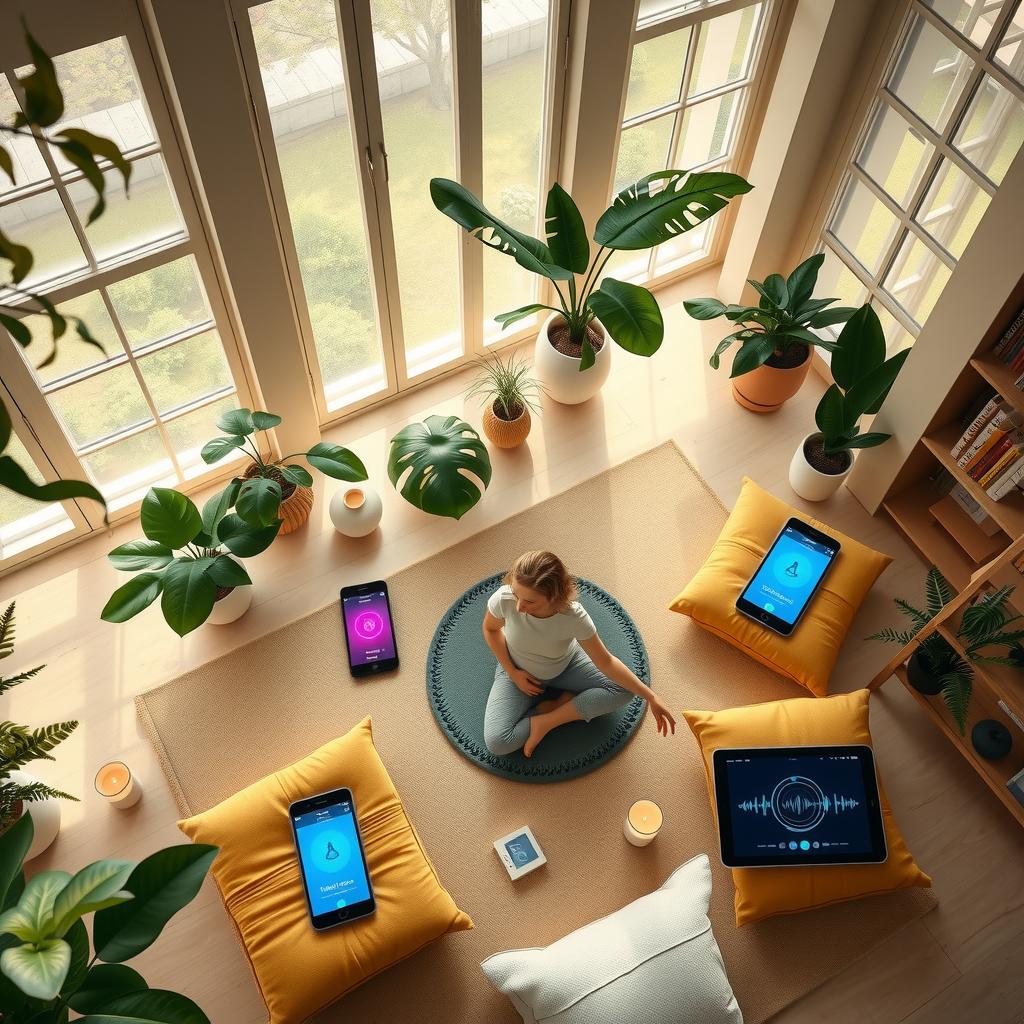In the fast-paced world of today, where stress and anxiety are ubiquitous, the pursuit of mental well-being has never been more crucial. As individuals increasingly turn to technology for support in their self-care strategies, guided meditation apps have emerged as powerful tools for fostering mindfulness and relaxation. This blog post presents a comprehensive meditation apps comparison, focusing on five leading contenders: Headspace, Calm, Insight Timer, Simple Habit, and Breethe. Each app offers unique features that cater to diverse user preferences, making it essential for users seeking effective stress relief solutions to understand what each platform brings to the table.
Headspace is renowned for its engaging approach to mindfulness techniques through animated guides and structured courses that appeal to both beginners and seasoned practitioners alike. Users often praise its user-friendly interface which enhances the overall experience, positioning it as an excellent choice for those starting their journey into guided meditation. On the other hand, Calm captivates with its serene landscapes and soothing soundscapes designed explicitly for relaxation practices. The app not only focuses on meditation but also incorporates sleep stories aimed at improving mental health benefits related to restfulness.
Meanwhile, users looking for a community-oriented experience may find Insight Timer particularly appealing due to its extensive library of free content contributed by a myriad of teachers worldwide. This vast array allows users to explore various styles of guided meditations without financial commitment while fostering a sense of connection among practitioners through shared experiences—an essential aspect when considering user experience review. Alternatively, those pressed for time can benefit from Simple Habit, which emphasizes short sessions tailored specifically toward busy lifestyles. Its focus on quick yet impactful mindfulness exercises makes it ideal for anyone seeking immediate stress relief during hectic days.
Lastly, there’s Breethe, which combines elements from all these platforms while incorporating additional wellness resources such as life coaching tips alongside traditional guided meditations. By offering varied content aimed at holistic self-care strategies—including sleep aids and relationship advice—Breethe stands out as a versatile option in this crowded market.
This article will delve deeper into these applications’ strengths through an in-depth analysis that highlights their distinct features, usability aspects within mobile environments, and overall effectiveness in promoting healthy habits through consistent practice—all vital components when assessing any top-tier guided meditation tool or resource.

Essential Elements:
The first crucial aspect to consider when exploring guided meditation apps is the variety of mindfulness techniques each app offers. For instance, Headspace stands out with its structured courses designed for users at different levels of meditation experience. It provides a wide range of themes, including stress relief and sleep improvement. In contrast, Calm focuses on creating an immersive experience through nature sounds and soothing visuals that enhance relaxation practices. Users can find it beneficial to engage in these tailored experiences as part of their self-care strategies.
Another significant consideration is the user interface and overall user experience review provided by these mobile meditation tools. Insight Timer excels in this area by offering an extensive library of free guided meditations from various teachers around the globe, making it highly accessible for users seeking diverse perspectives on mindfulness practices. Simple Habit appeals to busy individuals with its quick sessions that fit seamlessly into hectic schedules, promoting effective relaxation techniques even for those short on time. Breethe integrates music and storytelling elements within its meditative sessions, thereby catering to those who prefer a more engaging auditory experience.
Lastly, examining the mental health benefits associated with each app reveals how they align with individual needs regarding stress relief solutions. Headspace has been clinically validated for improving focus and reducing anxiety levels among users over time—an important factor considering today’s fast-paced lifestyle demands. Meanwhile, Calm’s emphasis on sleep stories can significantly aid in enhancing sleep quality; numerous studies highlight the connection between improved rest and better mental well-being outcomes. Insight Timer’s community features foster social support among meditators while Simple Habit promotes resilience through daily reminders that encourage consistent practice—essential components in any holistic approach to improving mental health through guided meditation.

Exploring Unique Features of Top Meditation Apps
Discovering the Benefits of Guided Meditation Tools
In today’s fast-paced world, finding moments of tranquility can be a challenge. This is where guided meditation apps come into play, offering users an effective way to practice mindfulness techniques and achieve stress relief solutions. Among the leading contenders in this space are Headspace, Calm, Insight Timer, Simple Habit, and Breethe. Each app provides unique features that cater to various user preferences and needs. For instance, Headspace‘s structured courses guide users through different meditation styles while incorporating animation for a more engaging experience. On the other hand, Calm‘s focus on sleep meditations combined with soothing soundscapes makes it an excellent choice for those seeking relaxation practices before bedtime. Meanwhile, _Insight Timer’s vast library boasts thousands of free meditations led by experienced teachers from around the globe, making it ideal for users who appreciate variety without financial commitment.
User Experience Review: Which App Reigns Supreme?
Evaluating Mobile Meditation Tools for Everyday Use
When conducting a meditation apps comparison, user experience plays a pivotal role in determining which app best suits individual lifestyles and preferences. For instance, many enthusiasts rave about how seamlessly intuitive both Calm‘s interface feels and its ability to keep them engaged with daily reminders that encourage consistent practice—a crucial factor in establishing self-care strategies through mindfulness routines. Alternatively, individuals seeking short bursts of relaxation may favor “Simple Habit,” designed specifically for busy schedules with sessions as brief as five minutes long—perfectly catering to those overwhelmed by time constraints yet eager to incorporate mental health benefits into their day-to-day lives. Furthermore, some users might find themselves drawn towards the community aspect offered by Insight Timer; its social features allow meditators to connect over shared experiences while accessing insights from others on similar journeys toward self-improvement.
The Science Behind Mindfulness Practices
Understanding How Apps Enhance Mental Well-being
The rise of guided meditation applications has sparked interest not only among casual practitioners but also within scientific communities examining their efficacy regarding mental well-being outcomes—particularly concerning anxiety reduction and emotional resilience enhancement through regular engagement with mobile tools such as Breethe or Headspace programs built upon proven therapeutic principles like cognitive behavioral therapy (CBT). Research indicates that even short daily sessions can foster significant improvements in mood regulation when integrated into routine life practices; thus underscoring why mindful engagement via these platforms should not be overlooked during times requiring heightened awareness or concentration levels amidst external distractions prevalent today’s society! Additionally noteworthy is how various features across each app—including customizable session lengths available within Simple Habit or curated playlists found throughout Calm*–can significantly impact adherence rates amongst participants striving toward personal growth goals centered around ongoing development related directly back towards overall happiness indices achieved via sustained mindful living habits cultivated over time using these innovative digital resources available at one’s fingertips!

Comparative Analysis of Top Mediation Apps
Exploring Features and Usability in Guided Meditation Applications
In the ever-evolving landscape of guided meditation, various applications like Headspace, Calm, Insight Timer, Simple Habit, and Breethe have emerged, each offering unique features designed to enhance user experience. For instance, Headspace is widely praised for its structured programs that cater to beginners and seasoned practitioners alike. It employs a vibrant interface that makes navigation intuitive, providing users with access to a diverse range of mindfulness techniques. In comparison, Calm places significant emphasis on sleep stories and soundscapes aimed at improving relaxation practices; this distinctive focus can be particularly beneficial for those seeking stress relief solutions through auditory experiences. Meanwhile, both Insight Timer and Simple Habit offer extensive libraries of free content, making them attractive options for budget-conscious individuals looking for mental health benefits without financial commitment. The user experience review often highlights how Insight Timer, with its community-based approach, fosters an environment where users can connect over shared mindfulness journeys.
Effectiveness in Promoting Mindfulness Techniques
Evaluating the Impact on Users’ Mental Health
Comparative analysis reveals varying effectiveness among these leading apps when assessing their ability to promote mindfulness techniques. A study highlighted by user testimonials indicates that while all five applications contribute positively to mental well-being, individual results may vary based on personal preferences and habits formed during usage. For example, many users note substantial improvements in their daily lives after using Breethe, which integrates guided imagery alongside traditional meditation methods tailored towards self-care strategies. On the other hand, research has shown that frequent use of apps like Simple Habit leads participants to develop consistent practices more rapidly due to shorter sessions designed specifically for busy lifestyles—ideal for those needing quick breaks throughout the day.
App Features Analysis
Key Attributes That Enhance User Experience
The app features analysis highlights critical attributes distinguishing each application within the competitive market of mobile meditation tools. One standout feature across most platforms is personalization; however, how this is achieved varies significantly between them. While Calm excels at curating a personalized journey based on mood assessments through engaging questionnaires upon sign-up processes—tailoring experiences accordingly—other contenders such as Headspace rely heavily on thematic courses guiding users progressively towards mastery over concepts like anxiety or focus enhancement through systematic learning paths. Furthermore, community interaction remains an essential aspect emphasized by both Insight Timer with its global meditative community forums and peer-reviewed classes alongside group meditations offered via virtual events—a feature lacking in some other applications where solitary practice predominates.
Accessibility Across Platforms
Navigating User-Friendly Interfaces
Accessibility across platforms plays a crucial role in determining overall usability ratings among meditation apps compared here today—the ease with which one navigates different offerings can greatly influence engagement levels among potential users searching diligently for effective relaxation practices tailored just right for them amidst hectic schedules or demanding lifestyles filled with responsibilities requiring attention management skills honed via regular practice sessions available instantly online! Thus far noted achievements include commendable efforts made by developers ensuring compatibility ranging from smartphones running iOS/Android systems up through tablets/laptops allowing seamless transitions whenever necessary depending upon what device might suit best suited tasks desired completing effectively enhancing overall satisfaction levels experienced collectively throughout respective journeys undertaken individually!
Conclusion: Making Informed Choices
Aligning App Selection With Personal Needs
Ultimately aligning app selection aligns significantly with personal needs surrounding coping mechanisms developed strategically employing cutting-edge technology now readily accessible worldwide fostering emotional resilience nurtured organically overtime utilizing tools provided herein including insightful analytics derived from ongoing exploration sharing insights gained collectively fostering deeper connections cultivating supportive environments encouraging growth experienced together ultimately aiding people everywhere striving toward improved states-of-mind enhanced fulfillment achieved effortlessly simply embracing these innovative solutions crafted thoughtfully addressing contemporary challenges faced continuously navigating complexities inherent modern-day living!
Personal Journeys in Mindfulness Practices
Discovering Calm Through Guided Meditation
Many users have shared their transformative experiences with mindfulness apps, particularly Headspace and Calm. For instance, a user named Sarah recounts how she initially approached meditation skeptically but found herself drawn to the structured guidance offered by these tools. After integrating daily sessions into her routine, she noticed significant improvements in her mental clarity and overall well-being. The app’s features allowed her to explore various mindfulness techniques, from short breathing exercises to longer guided meditations tailored for stress relief. This personalization was crucial; as Sarah puts it, “I never thought I could meditate until I tried the 10-minute daily sessions on Headspace. It made the practice feel accessible.” Such testimonials highlight how mobile meditation tools can facilitate a journey toward enhanced mental health by providing practical solutions that fit seamlessly into busy lifestyles.
Another practitioner, James, reflects on his experience with Insight Timer, noting its extensive library of free resources which helped him navigate through different types of meditation practices. He emphasizes that this platform stands out due to its diverse community of teachers and practitioners who share their insights and methods openly. “It feels like a global support system,” James explains, pointing out that he frequently participates in live classes which foster a sense of connection despite physical distances. Engaging with varied perspectives has enriched his understanding of relaxation practices beyond just traditional forms—he has discovered innovative approaches such as sound baths and mindful movement that complement his meditation practice beautifully. His user experience review indicates that such diversity is essential not only for deepening one’s practice but also for maintaining motivation over time.
Comparisons Among Leading Meditation Apps
Insights Into User Preferences Across Platforms
As users delve deeper into their mindfulness journeys using platforms such as Simple Habit and Breethe, they often engage in an informal comparison between these applications based on personal preferences and experiences gathered over time. Many find themselves gravitating towards specific features unique to each app while weighing them against one another in terms of effectiveness for their individual needs. For example, while Simple Habit offers quick meditations designed specifically for busy professionals looking for immediate stress relief solutions during work breaks or commutes, Breethe provides fully immersive audio landscapes aimed at enhancing sleep quality—a feature highly valued among those struggling with insomnia or nighttime anxiety.
Users report varying levels of satisfaction depending on what they seek from their chosen application; some prioritize extensive libraries filled with guided content while others appreciate minimalist designs focused solely on core concepts like breathwork or visualization techniques within these apps’ frameworks—a critical aspect when conducting any thorough app features analysis concerning user engagement levels and retention rates over time across different platforms.
Ultimately, what emerges from these narratives is not just anecdotal evidence but rather an emerging picture highlighting the profound impact that consistent use of guided meditations through popular apps can have on personal growth journeys related to self-care strategies—underscoring both emotional resilience building alongside tangible mental health benefits observed throughout prolonged usage periods among avid practitioners seeking solace amid life’s inherent chaos.
When evaluating guided meditation apps, Headspace stands out for its user-friendly interface and structured programs that cater to a wide range of mindfulness techniques. Users appreciate the app’s emphasis on gamification, which encourages consistent practice through progress tracking and rewards. This feature enhances the overall user experience review by making meditation more engaging. The mental health benefits are also significant, as Headspace offers tailored sessions designed for stress relief solutions and self-care strategies. With a focus on relaxation practices, this app is often recommended for beginners looking to establish a solid foundation in their mindfulness journey.
On the other hand, Calm provides an extensive library of soothing sounds alongside its guided meditations. Its unique features include sleep stories that help users unwind at night—a key component of effective relaxation practices. Through its diverse content offerings, Calm excels in providing various mobile meditation tools aimed at improving mental health benefits over time. The meditation apps comparison frequently highlights how Calm’s immersive environment fosters deeper connections with personal well-being while allowing users to explore different forms of mindfulness techniques without feeling overwhelmed.
For those seeking community engagement within their mindful practice, Insight Timer’s robust social features make it an excellent choice. It allows users to connect with others who share similar goals in their meditation journeys while accessing thousands of free meditations led by experts worldwide. This approach enriches user experiences by fostering motivation and accountability among peers engaged in similar self-care strategies or stress relief solutions. As part of any comprehensive app features analysis, it’s worth noting how Insight Timer’s vast resource pool can complement individual preferences when navigating through diverse relaxation practices.
FAQs:
Q: What type of content does Headspace offer?
A: Headspace offers structured programs that include guided meditations focusing on various themes such as anxiety reduction and better sleep patterns.
Q: How does Calm differentiate itself from other apps?
A: Calm differentiates itself with unique offerings like sleep stories and relaxing soundscapes aimed at enhancing relaxation practices before bedtime.
Q: Can I connect with others using Insight Timer?
A: Yes, Insight Timer includes social features that allow users to engage with a community focused on shared mindfulness goals while exploring numerous free resources available within the app.

Add a Comment